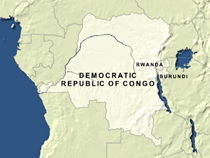-
(单词翻译:双击或拖选)
Nairobi
18 April 2007
Countries of the Great Lakes region of central Africa have resurrected a former political and economic alliance so they can cooperate on a number of initiatives. Cathy Majtenyi reports for VOA from Nairobi.
The Economic Community for the Great Lakes Region was first created in 1976 to promote the free movement of goods and people amongst the Great Lakes nations of Rwanda, Burundi, and the Democratic Republic of Congo.

Democratic Republic of Congo, Rwanda, Burundi
The arrangement lasted a little less than 20 years before it collapsed1 due to brutal2 civil wars in the region.
This week in Burundi's capital, Bujumbura, the foreign ministers of the three countries re-launched the bloc3, pledging to work together to bring peace and stability to the volatile4 area.
Rwandan presidential adviser5 Richard Sezibera tells VOA the Economic Community for the Great Lakes Region, CEPGL, is an important step for the three countries that were in open conflict barely a few years ago. Sezibera says it will have programs in several priority areas: peace, security and good governance, agriculture, energy, infrastructure6, education and research, and investments.
"We will now be talking about cooperating in alleviating7 poverty and encouraging development of the three countries," he said. "It is an important step, not only for the three countries but hopefully, if we can get the CEPGL to work well, then it will be a model for the rest of the countries in Africa that are emerging from conflict."
For more than a decade, the Great Lakes countries have been embroiled8 in internal and cross-border warfare9.
Burundi is just emerging from a civil war that broke out in 1993 after the Tutsi-dominated army assassinated10 the country's first democratically elected president, who was a Hutu. That conflict claimed about 300,000 lives.
An estimated 800,000 mostly Tutsis and moderate Hutus were slaughtered12 during Rwanda's 1994 genocide. Many of the Hutu extremists responsible for the mass murder fled into the Democratic Republic of Congo.
Periodic forays into DRC by the Rwandan army to hunt down the Hutu extremists have caused strife13 between the two countries.
A number of brutal rebel groups operating in DRC have caused havoc14 in that country throughout the years and have also crossed over into Burundi to slaughter11 Congolese refugees living in Burundi.
Rwandan presidential adviser Sezibera says, despite the chaos15, the three countries had managed to continue some programs set up under the old bloc, including an energy program that sees Rwanda getting power from DRC and a common travel document for the Great Lakes region.
He says Belgium and the European Union supported the re-launch and contributed resources to the community.
The Economic Community for the Great Lakes Region has three major institutions: the Economic and Development Bank of the Great Lakes countries, headquartered in DRC; the Energy of Great Lakes, also based in DRC; and the Institute of Agricultural Research and Zoology16, located in Burundi.
 收听单词发音
收听单词发音
1
collapsed

|
|
| adj.倒塌的 | |
参考例句: |
|
|
|
2
brutal

|
|
| adj.残忍的,野蛮的,不讲理的 | |
参考例句: |
|
|
|
3
bloc

|
|
| n.集团;联盟 | |
参考例句: |
|
|
|
4
volatile

|
|
| adj.反复无常的,挥发性的,稍纵即逝的,脾气火爆的;n.挥发性物质 | |
参考例句: |
|
|
|
5
adviser

|
|
| n.劝告者,顾问 | |
参考例句: |
|
|
|
6
infrastructure

|
|
| n.下部构造,下部组织,基础结构,基础设施 | |
参考例句: |
|
|
|
7
alleviating

|
|
| 减轻,缓解,缓和( alleviate的现在分词 ) | |
参考例句: |
|
|
|
8
embroiled

|
|
| adj.卷入的;纠缠不清的 | |
参考例句: |
|
|
|
9
warfare

|
|
| n.战争(状态);斗争;冲突 | |
参考例句: |
|
|
|
10
assassinated

|
|
| v.暗杀( assassinate的过去式和过去分词 );中伤;诋毁;破坏 | |
参考例句: |
|
|
|
11
slaughter

|
|
| n.屠杀,屠宰;vt.屠杀,宰杀 | |
参考例句: |
|
|
|
12
slaughtered

|
|
| v.屠杀,杀戮,屠宰( slaughter的过去式和过去分词 ) | |
参考例句: |
|
|
|
13
strife

|
|
| n.争吵,冲突,倾轧,竞争 | |
参考例句: |
|
|
|
14
havoc

|
|
| n.大破坏,浩劫,大混乱,大杂乱 | |
参考例句: |
|
|
|
15
chaos

|
|
| n.混乱,无秩序 | |
参考例句: |
|
|
|
16
zoology

|
|
| n.动物学,生态 | |
参考例句: |
|
|
|















